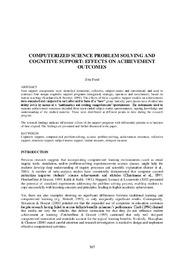Computerized science problem solving and cognitive support: effects on achievement outcomes

View/
Date
2005Author
Fund, ZviaPublisher
University of ZilinaPlace of publication
CY - ΛευκωσίαSource
CBLIS Conference Proceedings 2005 Integrating New Technologies in Science and EducationGoogle Scholar check
Keyword(s):
Metadata
Show full item recordAbstract
Four support components were identified (structural, reflective, subject-matter and enrichment) and used to construct four unique cognitive support programs (integrated, strategic, operative and enrichment), based on human teaching (Scardamalia & Bereiter, 1991). The effects of these cognitive support models on achievements were examined and compared to each other and to those of a “base” group. Initially, participants were divided into ability levels by means of a “mathematics and reading comprehension” questionnaire. The instruments used to measure achievement outcomes included three open-ended subject-matter questionnaires, tapping knowledge and understanding of the studied material. These were distributed at different points in time during the research program. The research findings indicate differential effects of the support programs with differential patterns as a function of time elapsed. The findings are presented and further discussed in the paper.
